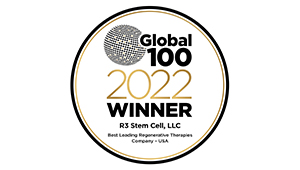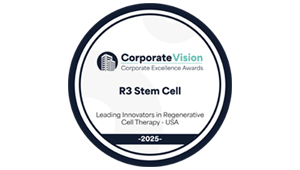What are amniotic stem cells?
Amniotic stem cells are extracted from the amniotic fluid via a process called amniocentesis or after a c-section from a consenting donor. This procedure allows the harvest of stem cells without harming the embryo, although there is a small risk of pregnancy loss during or following the procedure. The sparing of the embryo makes the harvest of amniotic stem cells more acceptable than embryonic stem cells.
By harvesting the amniotic fluid after the c-section, there is no risk of pregnancy loss.
Amniotic stem cells are pluripotent stem cells that are derived from the mesenchyme. Being pluripotential, these stem cells can differentiate into a wide variety of cell types, including nerves, bone, cardiac muscle fibers, skin and cartilage.
There has been an increase in funding for research on the use of amniotic stem cells for organ regeneration. It is now possible to store stem cells in private stem cell banks, and there has been significant growth in the stem cell industry.
How are stem cells used for treatment?
Stem cell therapy has been approved for very few conditions. Some studies have found that stem cell therapy is effective for immunological and hematological conditions.
There is research that shows amniotic stem cells have promising use in regenerative medicine. As these cells can grow into muscle, cartilage and other forms of tissue, therapies to inject stem cells to stimulate growth and healing are currently being assessed. Cell transplantation technology is currently being developed, and amniotic stem cells appear to be at the forefront of this field. Stem cells have also been marketed as anti-aging therapy, although research on this particular area has been limited.
Stem cells have been shown to provide promising outcomes in their therapeutic use for progressive and degenerative conditions such as arthritis, tendonitis, and poor-healing wounds. Movement disorders have also been shown to respond to stem cell therapy. It is theorized that these effects are secondary to the increased levels of cell growth and healing factors that accompany stem cell therapy. There are also attempts to use amniotic stem cells for tissue engineering, and for the development of organ transplants.
What are the outcomes for amniotic stem cell injections?
The effectiveness of stem cells as a therapeutic option varies, and more research still needs to be conducted before definitive endorsement of amniotic stem cell therapy can be made. However, this intervention has been shown to provide good outcomes in smaller studies and case reports.
Stem cell injection has been shown to be a well-tolerated procedure that is generally safe. The injection of amniotic stem cells is a minor outpatient procedure that allows a patient to be discharged within the same day.
It should be noted that adverse outcomes are fairly rare with stem cell injection. It also is important to differentiate the actual clinical improvements noted by your physician from any possible placebo effect(s).
Amniotic stem cell injections for musculoskeletal conditions has been increasing in popularity for a number of reasons. The most common reason is because the material is showing excellent results in small studies for arthritis, tendonitis and ligament injury.
Also, amniotic stem cell materials also contain a significant amount of hyaluronic acid along with anti-inflammatory factors. It’s part of what makes amniotic fluid so exciting is the multitude of ingredients!
If you are suffering from pain in the shoulder, hips, knees or ankles, it may be due to arthritis, tendonitis or a ligament injury. Amniotic stem cell therapy may help you with pain relief to avoid surgery and get you back to activities you want!
Click the Find a Doctor tab to find an R3 doctor close to you today!
References
Abdulrazzak H, De Coppi P, Guillot PV. Therapeutic potential of amniotic fluid stem cells. Curr Stem Cell Res Ther. 2013 Mar;8(2):117-24.
Ge X, Wang IN, Toma I, et al. Human amniotic mesenchymal stem cell-derived induced pluripotent stem cells may generate a universal source of cardiac cells. Stem Cells Dev. 2012 Oct 10;21(15):2798-808. doi: 10.1089/scd.2011.0435.
Petsche Connell J, Camci-Unal G, Khademhosseini A, Jacot JG. Amniotic fluid-derived stem cells for cardiovascular tissue engineering applications. Tissue Eng Part B Rev. 2013 Aug;19(4):368-79. doi: 10.1089/ten.TEB.2012.0561.
Rodrigues MT, Lee SJ, Gomes ME, Reis RL, Atala A, Yoo JJ. Amniotic fluid-derived stem cells as a cell source for bone tissue engineering. Tissue Eng Part A. 2012 Dec;18(23-24):2518-27. doi: 10.1089/ten.tea.2011.0672.
Saito S, Lin YC, Murayama Y, Hashimoto K, Yokoyama KK. Human amnion-derived cells as a reliable source of stem cells. Curr Mol Med. 2012 Dec;12(10):1340-9.

Dr. David Greene
MD, PhD, MBA
Dr. David Greene, MD, PhD, MBA, is a pioneering leader in regenerative medicine and healthcare marketing. As a residency and fellowship-trained orthopedic surgeon, Dr. Greene transitioned from clinical practice to become the founder and CEO of R3 Stem Cell and US Lead Network, where he has revolutionized patient care and medical practice growth through innovative therapies and digital marketing strategies. He has authored two influential books on healthcare internet marketing, ranks among the top expert authors globally, and has been featured on the cover of Corporate Vision magazine for his impact on global regenerative therapies. Beyond his professional achievements, Dr. Greene is passionate about education, compassion, and continuous innovation.










No Comments